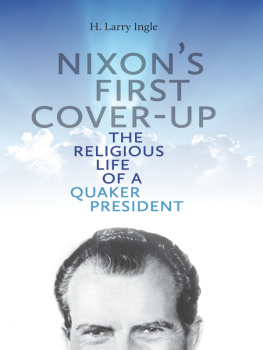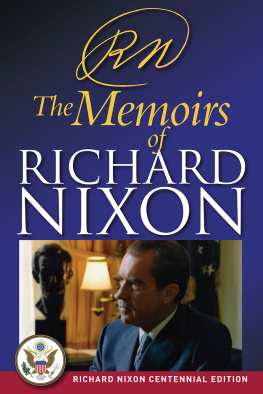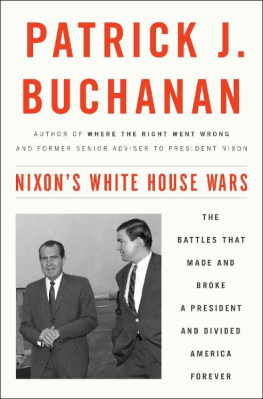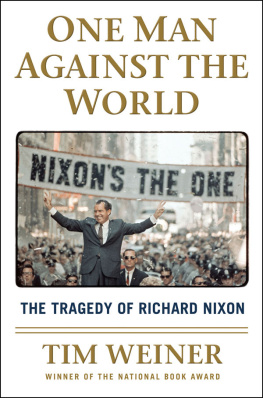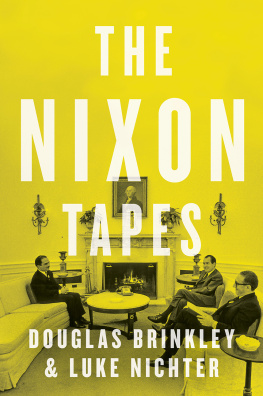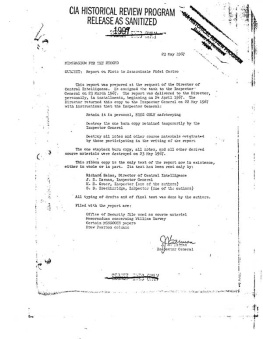T he logistics of preparing these conversations for publication have been complicated and difficult. There are no transcriptions and the tapes cannot be removed from the National Archives at this time. Professional court reporters and transcribers prepared the initial transcripts. My research assistant and I then listened to the tapes to fill in significant gaps of unintelligibles and to insure accuracy as far as possible. The process of deciphering the tapes is endless. Different ears pick up a once-unintelligible comment, or correct a previous understanding. Such is the nature of the material. I am aware of my responsibility for accuracy, knowing I have compiled a historical record that others will use. Some might find occasional errors in the rendering of particular words, but I am confident that there is no distortion of the thrust or intent of the passages.
I edited the conversations with an eye toward eliminating what I believe insignificant, trivial, or repetitious. I have used ellipses to telescope many conversations and often have omitted dutiful choruses of agreement by those present unless I believed them particularly important. The dialogue of innumerable uses of right, yeah, okay often has been dropped. I have retained many of Nixons phrases to reflect his manner of speaking, such as you get my point and you know what I mean. That is the authentic Nixon, I believe. The uhs and ahs usually have been eliminated, except when I think that they reflect the uncertainty in various voices, particularly Nixons. Unintelligible is used when I think that something important was said, but I could not capture it. Certain bracketed identifying references come from the official logs at the National Archives of the United States.
The rendition of spoken words into written ones has been a special challenge. Others have noted that there is nothing quite like Richard Nixon in his words; to listen to him on tape gives those words an even greater human, dramatic quality. I have tried to capture those qualities as much as possible by using italics, exclamations points, and, sometimes, bracketed phrases to describe emphasis and nuance.
When the first transcripts were published nearly a quarter-century ago, few could comprehend their meaning. Conversations were cryptic and vague, and some of the material was incomprehensible because of the lack of accompanying editorial apparatus. I hope that the headnotes, the identification of the various characters, and other editorial aids in this volume will help the reader.
There are three conversations in this volume that were previously published, and are included here because of their importance: June 23, 1972 (the smoking gun conversation), September 15, 1972 (a meeting with John Dean that gave the lie to Nixons later version of events), and March 21, 1973 (the cancer on the presidency conversation). All three conversations are newly transcribed and edited.
CAST OF CHARACTERS
Richard M. Nixon, President of the United States
Robert Abplanalp, personal friend of the President
Richard Allen, National Security Council aide
Joseph Alsop, columnist
Jack Anderson, columnist
Dwayne Andreas, businessman, contributor to both Hubert Humphrey and Nixon
Leslie Arends, Congressman (R-IL), Minority Whip
Bobby Baker, former aide to Senator Lyndon Johnson; convicted of bribery
Howard Baker, Senator (R-TN), Vice Chairman, Senate Select Committee
Dita Beard, lobbyist for ITT
Carl Bernstein,Washington Post reporter
William Bittman, E. Howard Hunts lawyer
Arthur Bremer, attempted assassination of George Wallace, May 1972
Patrick Buchanan, presidential aide
Stephen Bull, presidential aide
Alexander Butterfield, presidential aide; revealed taping system
Joseph Califano, former aide to Lyndon Johnson; close ties to Alexander Haig
Dwight Chapin, presidential aide
Anna Chennault, 1968 go-between for Nixon and the South Vietnam Government
Murray Chotiner, Nixon associate and aide since 1946
George Christian, LBJ press secretary; LBJ liaison with the Nixon Administration, 197273
Kenneth Clawson, White House Director of Communications
Charles Colson, presidential aide
John Connally, former Democratic Texas governor and later Nixon supporter
Archibald Cox, Special Prosecutor
CREEP, Committee to Re-elect the President
Kenneth H. Dahlberg, gathered money for Dwayne Andreas
Sam Dash, Majority Counsel, Senate Select Committee
John W. Dean III, Counsel to the President
Cartha DeLoach, FBI executive
Thomas Eagleton, Senator (D-MO); temporarily vice presidential candidate, 1972
John D. Ehrlichman, Counsel to the President and Chair of the Domestic Council
Daniel Ellsberg, former National Security official; leaked the Pentagon Papers
Sam Ervin, Senator (D-NC), Chairman, Senate Select Committee
Mark Felt, FBI executive
Fred Fielding, lawyer; assistant to Dean
Dr. Lewis Fielding, Daniel Ellsbergs psychiatrist
Robert Finch, Secretary of Health, Education, and Welfare; presidential aide
Leonard Garment, Counsel to the President
David Gergen, presidential aide
Billy Graham, evangelical leader; friend of the President
Katharine Graham, Publisher, Washington Post
L. Patrick Gray, Acting Director and later nominee for Director of FBI
Hank Greenspun, Las Vegas newspaper editor
Edward Gurney, Senator (R-FL); member, Senate Select Committee
General Alexander M. Haig, Jr., Chief of Staff to the President, 19731974; Haldemans successor
H. R. (Bob) Haldeman, Chief of Staff to the President, 19691973
Morton Halperin, National Security Council aide
Seymour Hersh,New York Times correspondent
Lawrence M. Higby, Haldeman aide
J. Edgar Hoover, Director, FBI
E. Howard Hunt, Watergate burglar; recipient of hush money
Tom Charles Huston,


